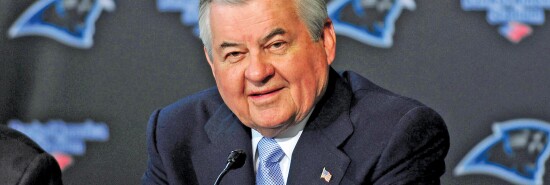
Jerry Richardson, 1936-2023
Daniel Ross Goodman
It is rare to leave a mark in one industry, rarer still to distinguish oneself in two, as North Carolina native Jerry Richardson managed to do in his oft-exciting, occasionally controversial, and wildly successful 86 years of life.
Born in Spring Hope, North Carolina, and raised in Fayetteville, Richardson’s passion for football — and, later, for business — took him and his family out of poverty and into realms that few of us can even fathom. After becoming a standout wide receiver at Wofford College in South Carolina in the mid-1950s, Richardson was drafted by the Baltimore Colts in 1958 but chose to return to Wofford for his final year of college eligibility. Had he gone pro that year, he would have played in the 1958 NFL Championship Game, the contest that many sports historians still consider to be the greatest football game ever played. Fortune would find a way to bless him anyway. When Richardson entered the league the following year, he wound up playing in the 1959 NFL Championship Game, catching a touchdown pass from Johnny Unitas — the greatest quarterback of that era — and helping lead the Colts to a second consecutive championship.
A contract dispute with the Colts following his rookie season gave Richardson second thoughts about having an extended NFL career. Rather than settle the dispute, he walked away from the team, taking the bonus money he had received from playing in the league championship game and investing it in the fledgling Hardee’s franchise, a restaurant company that had only just been created that year. Richardson opened the first Hardee’s in Spartanburg, South Carolina, the location of Wofford College. Richardson, the sure-handed receiver, took a hands-on approach to running the restaurant, not only managing the books but flipping the burgers himself. As in his abbreviated football career, whatever the Midas-fingered Richardson touched prospered. Working with his college quarterback Charles Bradshaw, within a few years, the duo owned and operated hundreds of Hardee’s restaurants throughout the region, eventually acquiring a 50% ownership stake in the company. Richardson and Bradshaw founded their own food management services company, Spartan Foods, to oversee the operation of their Hardee’s franchises (which at one point totaled over 500 restaurants) as well as the over 200 Quincy’s steakhouses and over 1,000 Denny’s restaurants. Spartan Food Systems, Inc. went public in 1970 and was listed on the New York Stock Exchange that year.
Although Richardson’s restaurant management was thriving, he never relinquished his passion for the sport that had enabled him to buy into Hardee’s in the first place. When the NFL was looking to add two expansion teams to the league in the early ’90s, Richardson successfully lobbied the league to have one of those teams be located in the growing metropolis of Charlotte. In 1993, Richardson paid the NFL $206 million for the rights to what would become the Carolina Panthers; in 2018, he sold the team for $2.2 billion. Not a bad profit for someone who grew up so poor, his family was sometimes without electricity or running water.
During Richardson’s tenure as owner, the Panthers made the Super Bowl twice, losing to teams quarterbacked by Tom Brady and Peyton Manning — no shame there either. His span as owner was, however, not scandal-free; a 2017 Sports Illustrated investigation uncovered allegations of workplace misconduct, compelling Richardson to step away from the team and put the franchise up for sale the following year. Despite its ignominious end, Richardson’s overall tenure with the team is mostly remembered with great fondness. Former Panthers tight end Greg Olsen, for now, Fox’s lead NFL color commentator until Tom Brady steps into the booth, recounts that when his infant son was dealing with a life-threatening medical issue, Richardson lent Olsen’s family his private plane so they could travel to Boston Children’s Hospital as often as they needed to. Richardson also donated over $250 million over the course of his life to his alma mater, among his other charitable activities.
“The odds against us [getting an NFL franchise] were huge,” Richardson recalled, speaking of his founding of the Panthers. “People had said it was 150-1, 200-1. That never deterred me. I didn’t pay any attention to it. I was told I couldn’t get my company on the New York Stock Exchange before I was 40. I was told, ‘You can’t make money selling hamburgers for 15 cents.’ I’ve been told a lot of things.”
Daniel Ross Goodman is a Washington Examiner contributing writer and the author, most recently, of Somewhere Over the Rainbow: Wonder and Religion in American Cinema.
